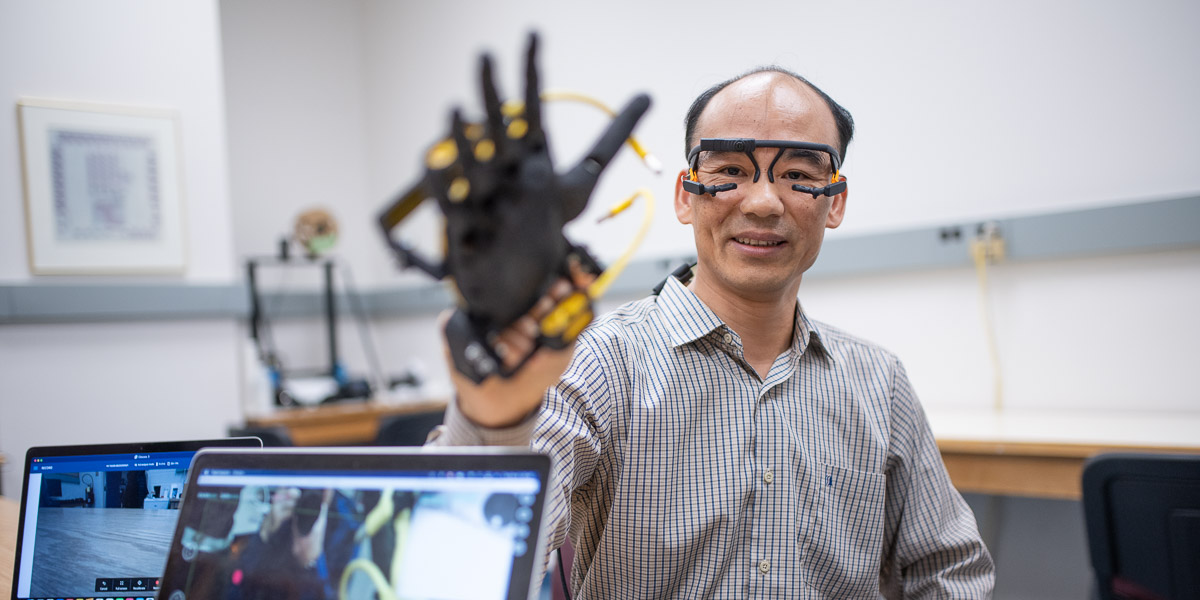News
Side Hustle Showcase: a student pop-up market
The event is a pop-up market featuring Memorial University students who are building businesses, launching creative projects and growing their side hustles.
AI in the sky: Memorial student aims to shed new light on our universe and transform astronomical research as we know it
Studying galaxies is essential for astronomers seeking to gain an understanding of the universe’s history and future.
Memorial University expands support for Canadian Armed Forces members
Memorial University is expanding its support for Canadian Armed Forces (CAF) members to have their military service experience and education recognized as course credit equivalents.
Memorial launches Canada’s first university-housed, student-managed social impact fund
On June 26, Memorial University launched the Fairlead Social Impact Fund, Canada’s first university-housed, student-managed impact investing fund.
Eastern Edge Robotics won third place and more at the Underwater Robotics World Championships
Several Newfoundland and Labrador teams competed at the 2025 MATE ROV World Championship in Alpena, MI this past weekend, and captured various major awards.
Fisheries and Marine Institute to hold 2025 graduation ceremony
Students at the Fisheries and Marine Institute of Memorial University will receive diplomas, advanced diplomas and certificates during the 2025 graduation ceremony scheduled for Friday, June 20.
Shifting environmental conditions contribute to northern cod collapse and recovery
A Marine Institute researcher is the lead author of a scientific paper that examines the impact of shifting northwest Atlantic Ocean climate conditions on groundfish stocks, such as northern cod.
Ten ping pong balls: Memorial University researcher releases findings of plastic in sea turtles study
More than a garbage truck’s worth of plastic enters the ocean every minute.
So, understanding how plastic moves through the ocean and where it ends up is critical for determining the harm it inflicts on wildlife and humans.
Dr. Alice (Xia) Zhu, one of Memorial University’s newest Banting post-doctoral scholars, has begun her research on the fate of plastic in our oceans.
Aquarena media tour
Memorial is providing an opportunity for media to tour the newly renovated Aquarena facility on Tuesday, June 10, at 11 a.m.
Botany on the Rock: National conference bringing leading speakers, inspiring field trips, and botanical art showcase
For the first time since 1978, the Canadian Botanical Association-L’ Botanique du Canada is bringing its national annual meeting and conference back to Newfoundland and Labrador.
Annual World Oceans Day family event at the Marine Institute on Saturday, June 7
Celebrate World Oceans Day with a free family event at the Marine Institute on Saturday, June 7. Activities for all ages take place from 10 a.m.-3 p.m. at the Marine Institute campus at 155 Ridge Rd. in St. John's.
Memorial University panel to consider: What do universities owe the public?
As higher education across Canada faces a range of significant challenges, Memorial University’s Office of Public Engagement is inviting all members of the university and the public to attend a free panel discussion that will consider: What do universities owe the public?
'SurgeCon 3.0': Memorial University doctor’s software is cutting wait times in rural emergency rooms
A 2025 study by the C.D. Howe Institute found that Newfoundland and Labrador is among the worst in Canada in terms of access to health care.
The shortage of family doctors in the province means a hospital is the only place many communities can receive medical care, which causes congestion and excessive wait times in emergency rooms.
That’s why Carbonear General Hospital worked to find a practical solution — and cut its wait times by 60 per cent.
Back and twice as big: Memorial University’s EDI-AR Conference returns May 22-23
After drawing more than 250 participants from across Canada and around the world in 2024, Memorial University’s International Equity, Diversity, Inclusion, and Anti-Racism (EDI-AR) Conference is back by popular demand for a second year.
Dr. Sylvia Moore named inaugural UArctic chair, will champion Indigenous and northern education
A new initiative is set to transform how northern communities connect, collaborate and shape their educational futures.
Sylvia Moore, vice-provost, Labrador Campus, and dean of Memorial University’s School of Arctic and Subarctic Studies pro tempore, has been appointed the inaugural chair of Indigenous and northern education by the University of the Arctic (UArctic).
Memorial University-based initiative aims to build a whole new sector in Newfoundland and Labrador
In the fight to combat climate change, few solutions are being championed more than carbon storage. But the province hasn’t had the support system required to build an industry around carbon storage — until now.
Memorial University to host Disaster Chef Challenge on Wednesday, May 7
This week is National Emergency Preparedness Week, which reminds people to be prepared for emergencies by having an emergency kit in their homes stocked with non-perishable food items in case of emergencies and prolonged power outages.
To raise awareness in a fun and engaging way, Memorial’s Protective Services will host a cooking contest known as the Disaster Chef Challenge.
Marine Institute to host 2025 Regional MATE ROV Competition
Thirty-four teams from junior high and high schools from Newfoundland and Labrador, Nova Scotia, Ontario and Prince Edward Island will compete in the 2025 Regional Marine Advanced Technology Education (MATE) Remotely Operated Vehicle (ROV) Competition from May 2-3.
Double winner: it’s been a big month for Memorial superstar student Nathan Young
Not every 12-year-old asks for shares in a business for his birthday. But that was the moment that started Memorial University student Nathan Young on his path to studying commerce and economics.
Memorial University welcomes Dr. Janet Morrison as next president and vice-chancellor
The search for Memorial University’s president and vice-chancellor has concluded with the appointment of Dr. Janet Morrison, an educator, advocate, thought leader and transformational change agent in Canadian post-secondary education.
What do our oceans need from us to keep providing for us? Report floats key next steps
Human beings are more reliant on the world's oceans than ever before: more than 90 per cent of global trade is conducted by ships, 20 per cent of the protein we consume comes from seafood and the ocean is playing a vital role in mitigating global climate change.
Graduation day: Memorial University to confer seven honorary degrees during spring convocation ceremonies
An academic highlight, Memorial University’s spring convocation ceremonies will see more than 3,000 degrees, including more than 900 graduate degrees, conferred.
Provincial budget: Memorial University welcomes enhanced investment
Yesterday, April 9, the Government of Newfoundland and Labrador released its 2025 budget. It included significant investment in Memorial University.
Scientists to ‘speak without jargon’ or face a gong at public pitching event April 10
For scientific researchers at Memorial, being able to pitch to media and research funding agencies is a pivotal skill that can gain them exposure and support. But as anyone who works in media knows, scientists are not always the best at explaining the significance of their work in clear and accessible language.
Memorial University acceptance letters for first group of learners at Faculty of Medicine’s new PEI campus being delivered
Today, 20 Prince Edward Island residents are receiving a letter that could change their lives. Acceptance letters from Memorial University for the first group of learners at the Faculty of Medicine’s new regional campus on Prince Edward Island (PEI) are being delivered to inboxes.
Health-tech student startups win $40,000 at ninth annual Mel Woodward Cup
Student-led companies offering solutions to health-care problems topped the ninth annual Mel Woodward Cup last night.
Kierep Enterprise, founded by Samuel Adeniyi, won the top prize of $25,000 for his job search app that helps assess certifications for personal care workers and speed up the hiring process for care agencies.
Memorial's business faculty to recognize Fortis, Woodward leaders
Business leaders Jocelyn Perry and Peter Woodward will be honoured by Memorial University’s Faculty of Business Administration at its 38th annual Partners Celebration on Wednesday, April 9, at the Emera Innovation Exchange, Signal Hill Campus, in St. John's.
Marine researchers taking closer look at climate change impacts on regional ecosystems and fisheries
A group of scientists studying the global impact of climate change on marine ecosystems and fisheries will refocus its efforts on regional impacts following the release of their latest study.
Memorial University students to host 60th annual Business Day
From national union and government leaders to local entrepreneurs and visionaries, Business Day has had them all. The annual event is led by graduating commerce students at Memorial University and, this year, Business Day marks 60 years.
Curing the ‘Newfoundland Curse’: Memorial University marks Heart Month with life-saving ARVC research update
For centuries, many Newfoundland and Labrador families suffered a heartbreaking mystery: their loved ones were dying suddenly and without explanation.
Business faculty implements new admission standards to broaden access to MBA
Memorial University’s business faculty is making its Master of Business Administration (MBA) Program more accessible for Newfoundlanders and Labradorians.
The Rooms exhibit showcasing Memorial University’s decades-long support of visual arts
The Memorial University Art Gallery opened in 1961 to collect, champion and showcase the work of local artists. It is heralded for having played a role in launching the careers of legendary artists like Mary Pratt, Christopher Pratt, Gerald Squires, Helen Parsons Shepherd and David Blackwood.
Memorial University, OCAD University partnership bringing learning opportunities to N.L.
In addition to Memorial’s offerings, the Continuous Adult and Lifelong Learning hub has begun forming partnerships with other educational institutions to expand its catalogue. Most recently, Memorial partnered with the Ontario College of Art and Design University.
Annual marine industry competition develops student know-how and leadership skills
Students in the Marine Institute’s nautical science and marine engineering programs will participate in the thirteenth annual Nautical Skills Competition from Feb. 7-8. The Master Mariners of Canada N.L. Division hosts the annual competition in collaboration with the Fisheries and Marine Institute of Memorial University.
Alumna-led program shaping a new generation of ‘limitless’ women leaders
A Memorial University program open to all women undergraduate students interested in pursuing leadership roles aims to unlock their full potential. The Limitless Leadership Program offers leadership-themed workshops, one-on-one coaching and professional networking. It launched in September 2024.
Memorial University responds to auditor general report on Facilities Management
The Office of the Auditor General released a performance audit report on Memorial University’s Facilities Management on Jan. 21.
Memorial University ranked No. 1 nationally for using AI to enhance and accelerate research

Artificial intelligence (AI) is accelerating medical breakthroughs at an unprecedented rate for researchers nationwide. It can process data in minutes instead of months, see things the human eye cannot and conduct previously inconceivable experiments. And when it comes to using AI to break new ground, Memorial University’s researchers are coming out on top.
Oxford bound: Newfoundland and Labrador has named its 2025 Rhodes Scholar

Every year, one student in our province is chosen as the Rhodes Scholar for Newfoundland & Labrador. Just one. This month, a recent Memorial University graduate, Meret Ebsary, became that one student. As a Rhodes Scholar, she’ll now pursue fully funded graduate studies at the famed University of Oxford in the U.K.
More than moose the eye: Is N.L.’s iconic herbivore curbing climate change in our province?

Climate change and declining biodiversity are two of the most pressing environmental issues of our time, yet they’re always addressed separately. Memorial University’s Dr. Kristy Ferraro is bridging this gap.